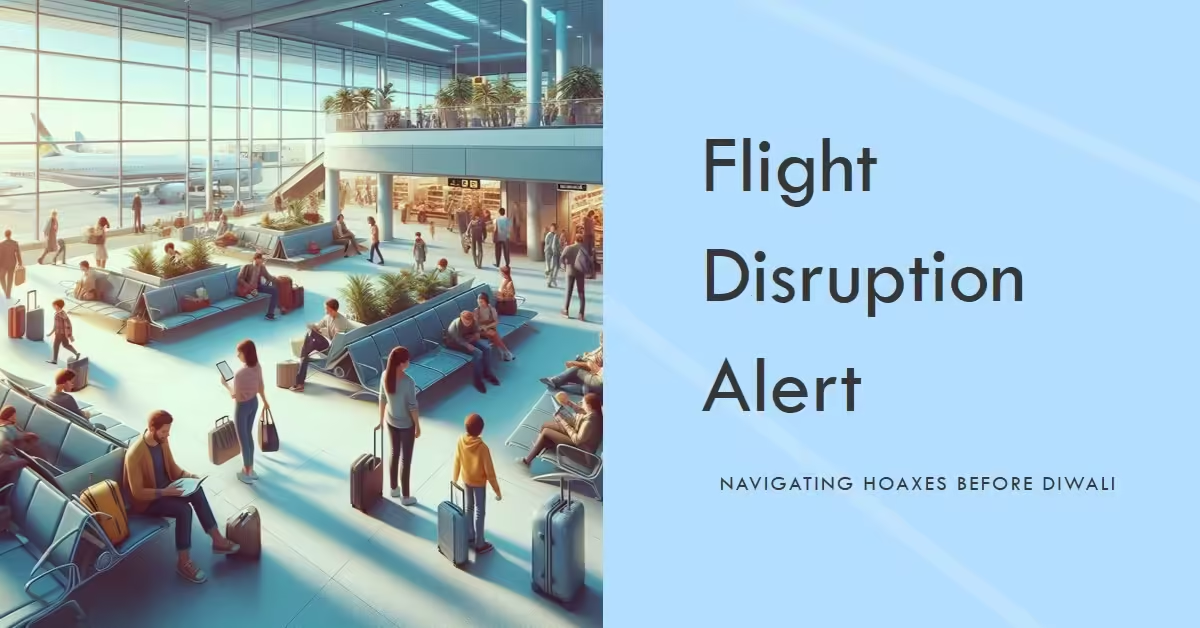As the Diwali holiday season approaches, bomb threats to flights have raised alarm among Indian airlines and travelers alike. Recent bomb hoaxes have impacted major airlines, including IndiGo and Air India, leading to heightened security protocols and flight disruptions across airports in India. These false alarms not only cause inconvenience to passengers but also strain airline resources and heighten public anxiety. This article covers the latest updates on the threats, airline responses, and important security measures travelers need to know before they fly.
The Rise in Bomb Hoaxes Affecting Indian Airlines
With Diwali just around the corner, airports in India are witnessing an increase in foot traffic as families and individuals travel to celebrate the festival. However, recent bomb threats have disrupted travel plans for many, leading to flight delays and cancellations as airports enact emergency procedures to ensure passenger safety. Key incidents over the past few weeks include:
- IndiGo Airlines: IndiGo experienced multiple bomb hoaxes in October 2024, resulting in temporary grounding of flights and thorough security checks. Although no bombs were found, these threats caused significant delays, impacting hundreds of passengers during a busy travel period.
- Air India: Similar incidents have affected Air India, forcing the airline to reroute flights and intensify security screening procedures for passengers and luggage. These hoaxes have added pressure to already busy airport personnel, who must ensure thorough security checks while managing flight schedules.
- Other Airlines and Airports: Threats have also impacted other domestic and international airlines operating in India, including at major airports like Delhi’s Indira Gandhi International Airport, Mumbai’s Chhatrapati Shivaji Maharaj International Airport, and Bengaluru’s Kempegowda International Airport.
These false alarms come at a high cost, both financially and logistically, as airlines allocate resources to handle security threats that ultimately turn out to be hoaxes. The recurring nature of these threats has prompted airlines to reassess their safety protocols, even as they continue to work closely with airport authorities and security agencies.
Related Content:
Airline Responses: How IndiGo, Air India, and Others Are Managing Security Threats
In response to the recent bomb threats, airlines in India have implemented heightened security measures to protect passengers and ensure timely travel. IndiGo, Air India, and other affected airlines have released statements reassuring travelers of their commitment to passenger safety and emphasizing the importance of vigilance in times of increased threat.
- Increased Security Screening: Airlines have expanded security checks at boarding gates and enhanced luggage inspections. Passengers are advised to arrive at airports well ahead of their departure times to allow sufficient time for these screenings.
- Collaboration with Security Agencies: Indian airlines are working in tandem with the Central Industrial Security Force (CISF) and local police forces to investigate each threat. Security personnel are stationed at key locations across airports to swiftly address any suspicious activity.
- Communication with Passengers: Airlines are actively communicating with passengers through email and social media channels to keep them informed of potential delays or cancellations caused by security alerts. Travelers are encouraged to stay updated on their flight status before heading to the airport.
- Protocol Adjustments: Many airlines have updated their protocols for handling threats to prioritize safety without compromising too heavily on flight schedules. Passengers can expect stricter regulations regarding carry-on items, and some may even experience brief interviews by security personnel at check-in counters.
External Resource:
Understanding the Impact of Bomb Hoaxes on Travelers and Airport Operations
Bomb threats have serious implications for airport operations and passenger experience. Some of the major challenges caused by these incidents include:
- Flight Delays and Cancellations: Bomb threats necessitate an immediate response from airlines, which often means grounding flights, clearing planes, and conducting exhaustive checks. This can result in significant delays, particularly frustrating for travelers on tight schedules.
- Public Anxiety and Safety Concerns: While authorities assure travelers of safety measures in place, bomb threats naturally heighten anxiety among the public. People may feel unsafe boarding flights, particularly in the lead-up to Diwali when the volume of passengers is exceptionally high.
- Financial Costs to Airlines and Airports: Bomb threats demand an allocation of additional resources, from deploying security personnel to conducting extensive inspections. These operations incur costs that are ultimately borne by airlines, which are already managing high volumes of traffic during the festive season.
- Strain on Security Resources: Indian airports have a finite number of security personnel and resources, and bomb threats divert these resources, sometimes impacting the speed and efficiency of regular airport operations.
Related Content:
How to Stay Safe While Traveling During the Festive Season
For those traveling during Diwali, staying informed and prepared can help make the journey smoother, even amidst potential disruptions. Here are some important travel tips to keep in mind:
- Stay Updated on Flight Status: Use airline mobile apps or regularly check the airline’s website to stay updated on flight schedules. Most airlines provide real-time updates regarding any potential delays or cancellations.
- Arrive Early at the Airport: Given the enhanced security measures, passengers should arrive at the airport at least 2-3 hours before domestic flights and 4 hours before international flights to ensure they have ample time for check-in and security screening.
- Pack Wisely: Follow airline guidelines for luggage restrictions and avoid packing prohibited items in your carry-on. This can help expedite the screening process and reduce unnecessary delays.
- Keep Important Documents Handy: Security personnel may request to see identification documents or boarding passes at various points. Keep these documents easily accessible to avoid delays.
- Maintain Calm and Cooperate with Security Checks: In the event of a bomb threat, follow the instructions of airport personnel and remain calm. Cooperation can help authorities resolve security concerns more efficiently.
- Consider Travel Insurance: While bomb threats are rare, travel insurance can provide coverage for disruptions, delays, and other unexpected events. This could be particularly valuable during the busy travel season.
External Resource:
Government and Regulatory Body Responses to Recent Threats
In response to the rise in bomb threats, India’s Directorate General of Civil Aviation (DGCA) and other regulatory bodies are monitoring the situation closely. Measures being implemented by these authorities include:
- Enhanced Security Protocols: The DGCA has issued advisories to airlines, mandating additional layers of security screening and precautions. Regular checks are being conducted to ensure compliance with these directives.
- Coordination with Intelligence Agencies: To address potential threats proactively, Indian aviation authorities are collaborating with intelligence agencies, both domestic and international, to analyze threat patterns and prevent potential security incidents.
- Public Awareness Campaigns: Airport authorities are working to inform travelers about safety procedures and appropriate conduct during emergencies. Awareness campaigns encourage passengers to report suspicious activities and follow protocols when threats arise.
- Cybersecurity and Threat Monitoring: Given the possibility of threats originating from digital channels, the DGCA is enhancing its cybersecurity protocols to monitor threats communicated through online platforms or social media. Collaboration with cybersecurity agencies aims to trace and respond to threats before they can disrupt flights.
Related Content:
Conclusion
The recent surge in bomb threats targeting flights in India is a sobering reminder of the importance of rigorous security protocols, especially during high-traffic seasons like Diwali. As airlines and regulatory bodies work to protect passengers, travelers can also play a role by staying informed and adhering to safety guidelines. Although these threats are intended to cause disruption, coordinated efforts from authorities, airlines, and passengers can help ensure a safer travel experience.
As the situation develops, both travelers and airlines are encouraged to remain vigilant and take all necessary precautions. Through collective cooperation and continued improvements in security measures, India’s aviation sector aims to navigate these challenges and provide a safe environment for all passengers.










